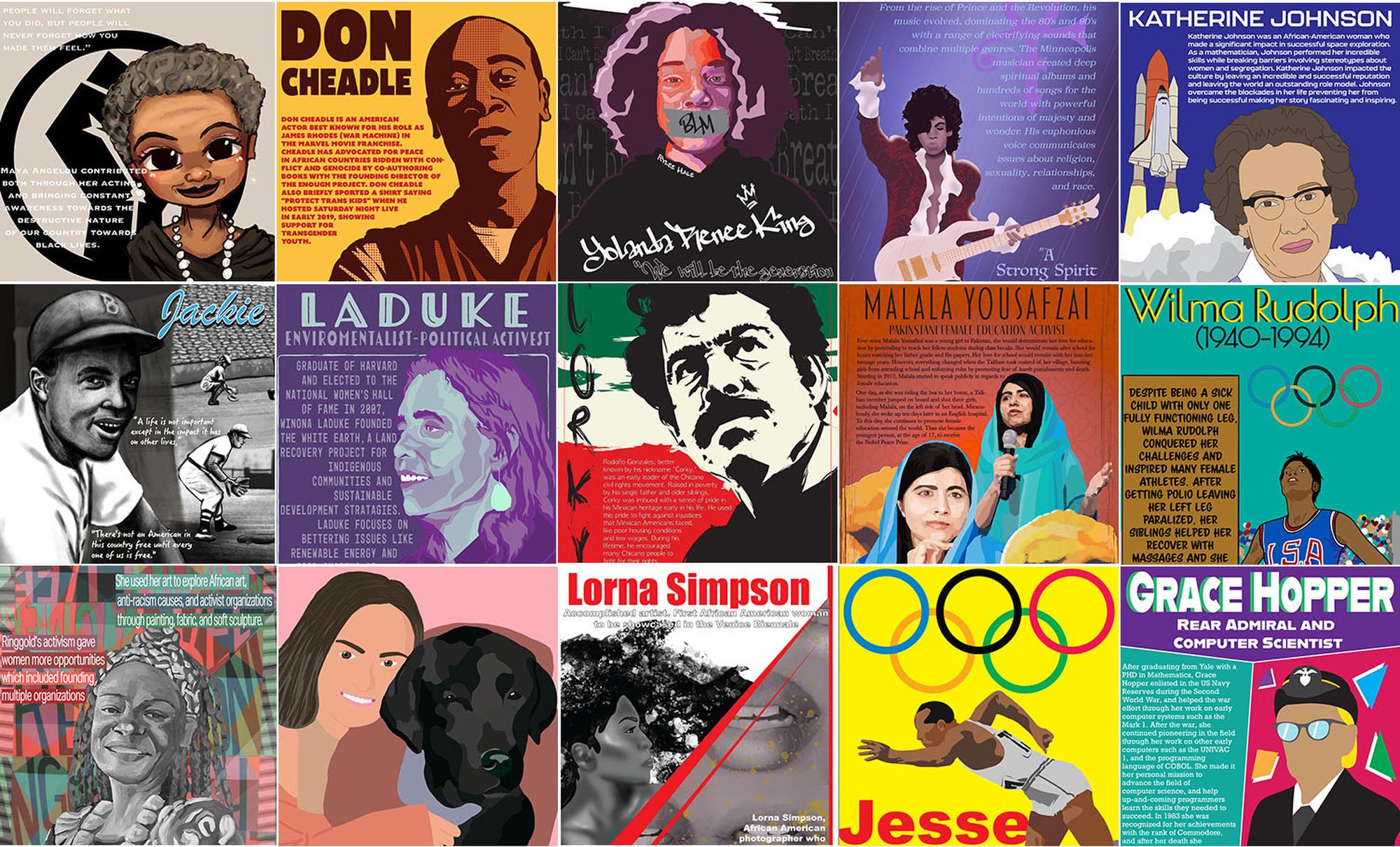
The last year has been one marked with much upheaval: Racial justice protests, political turmoil and the pandemic all left their mark on each and every person, and students were not immune to it. So the faculty at Warren Tech in the Jefferson County School district wanted to give their classes a way of conveying how the last year has changed them. They found their medium in the poster.
Students in the graphic design program were tasked with creating a poster of a cultural icon a student felt was a positive influence on society, especially when the person was faced with discrimination, challenges, and inequity.
“We wanted to do something to give students a way to express things that they might be thinking," said Scot Odendahl, graphic design instructor.
Graphic design is one of 37 programs at Warren Tech that allow students to work with faculty and industry partners in real-world professional projects, internships and apprenticeships.
Working with the English teacher, the students researched “people out there that they had no idea about," said graphic design instructor Peter Cunis. “They were teaching each other. The conversations in class were great, like, ‘Oh wow, you've never heard of this person, let me tell you.’ They all learned a lot.”
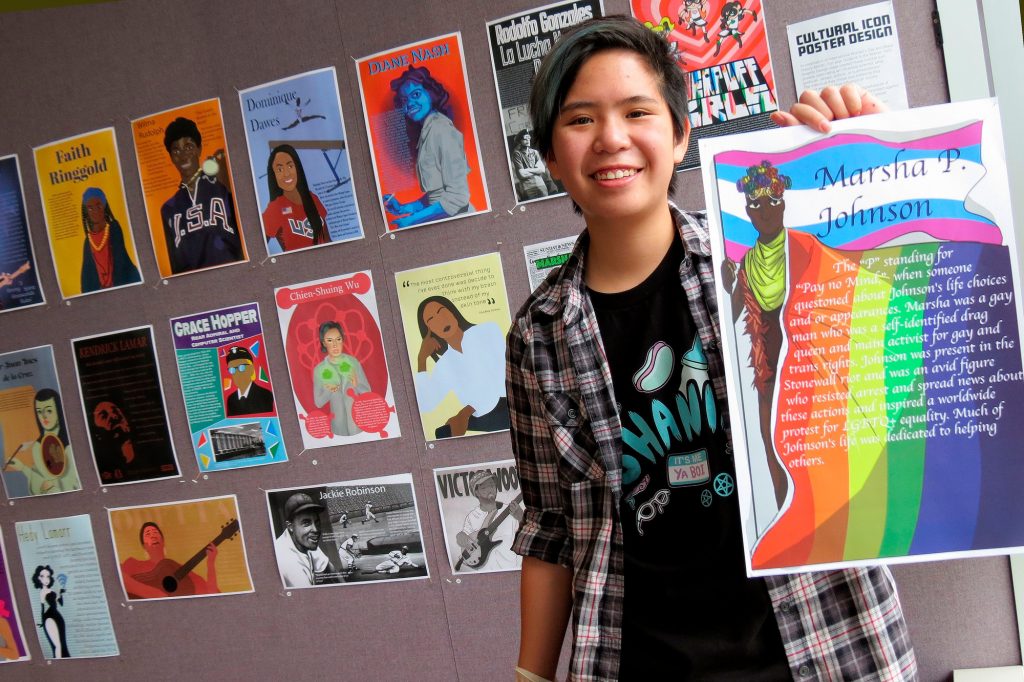
Ryan Branstrom, a junior, chose Marsha P. Johnson, a self-identified drag queen and political activist. Johnson left home at a young age with $15 in her pocket and a bag of clothes. She was a member of several gay and transgender activist groups, and helped establish the Street Transvestite Action Revolutionaries (STAR) in 1970 — a gay, gender-nonconforming and transgender activist group committed to providing housing and support to homeless LGBTQ youth in New York City. The “P” in Marsha P. Johnson stood for “pay it no mind,” her retort when people asked questions about her gender.
“I wanted to do a figure that is important to me as a member of the LGBTQ community. Marsha just kept pushing and kept advocating for rights, and giving people homes who were kicked out of their houses for reasons that they were maybe gay.
It kind of made me feel kind of happy, kind of less scared, that someone did believe that these things are not illnesses that can be cured, that are part of a human and that’s like their personality — you can’t change that. It’s kind of nice to think about that too, because that makes me think like, ‘Hey, this is who I am.’ It is really empowering. It kind of gives you a boost of confidence. All my friends know [that Ryan identifies as nonbinary] but my family does not. It’s nice that I have a place where I can feel safe and be myself, like here at Warren Tech. Everyone is very accepting.”
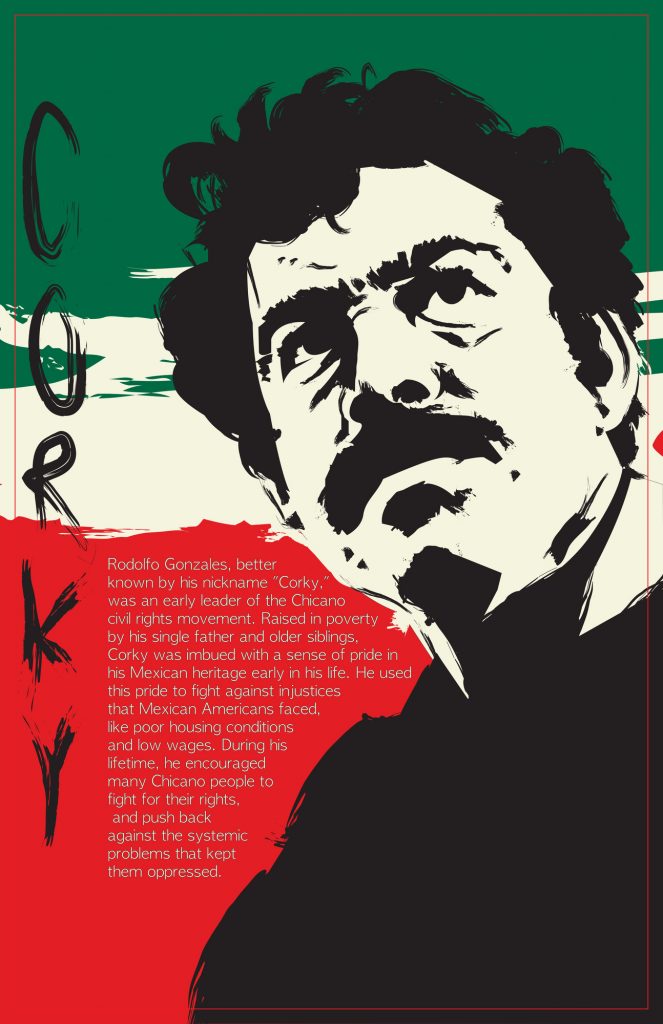
Liam Passerella, a junior, chose Rodolfo “Corky” Gonzales — a Chicano poet, boxer, and national political organizer in Denver — as his poster subject. The son of migrant sugar beet farmers, Gonzales helped organize the Crusade for Justice, a civil rights organization promoting Chicano nationalism and social change and social justice. He organized liberation conferences for youth and student walkouts to protest low expectations and the lack of a Chicano curriculum in schools. Many of his writings focused on self-determination for Chicanos and were an exploration of the Chicano identity, a combination of identities, Indian, European, Mexican and American.
“I really like some of his writing. He wrote ‘Yo Soy Joaquin,’ that poem about fighting for his Mexican and Latino heritage in American and trying to persevere for his culture. When you’re able to ground something like this movement in where you live, you’re able to see the impacts of the movement a lot more easily…. I see people who are not afraid to be who they are and represent their culture and their heritage…. [Gonzales] also used to box. He was the featherweight champion, so that’s pretty cool. [Gonzales] was raised by his single father. He and all of his siblings did farm work …. That was some of what he was trying to bring to our attention … the brutal work conditions. He was fighting for better treatment of all of these workers. He’s definitely inspirational, trying to make lives better for people in his community.”
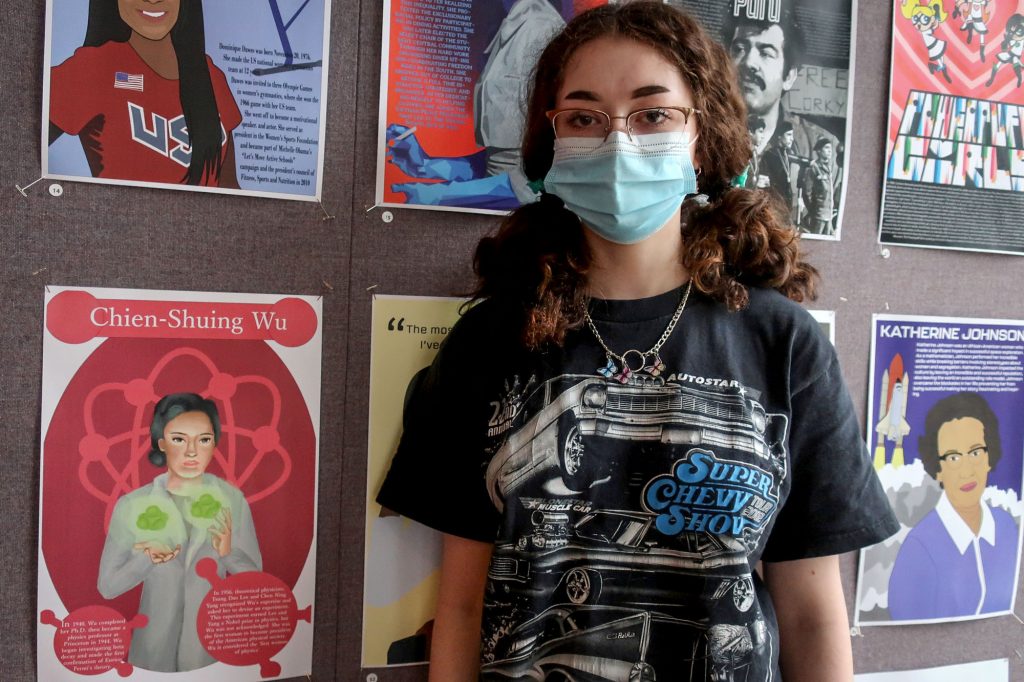
Junior Summer Rice made a poster of Chien Shiung Wu, an Asian American physicist born in China in 1912. After pursuing advanced education in the United States, Wu helped develop the process for separating uranium metal into isotopes by gaseous diffusion. She developed an expertise in beta decay. Wu played a major role in proving a theory that the law of conservation of parity did not hold true during beta decay, according to the Atomic Heritage Foundation. But Wu was not fully recognized for her contribution; her two male colleagues won a Nobel Prize, and Wu did not. Wu’s book ‘Beta Decay’ is still a standard reference for nuclear physicists.
“I knew I wanted to do something in the science field because a lot of women are overlooked for their work in that field. I decided to do [Wu] because when I was researching I saw that she was overlooked for a lot of her work. Two male physicists earned a Nobel Prize for an experiment she was heavily involved in. She wasn’t acknowledged for her work. Right now, with all the Asian American hate crimes, I wanted to do a poster of an Asian American woman because of that. I thought it was impressive all the obstacles she had to face, moving to America and going to university here. And especially at that time I read that education for young girls wasn’t very common, but her father wanted her to be in school.”
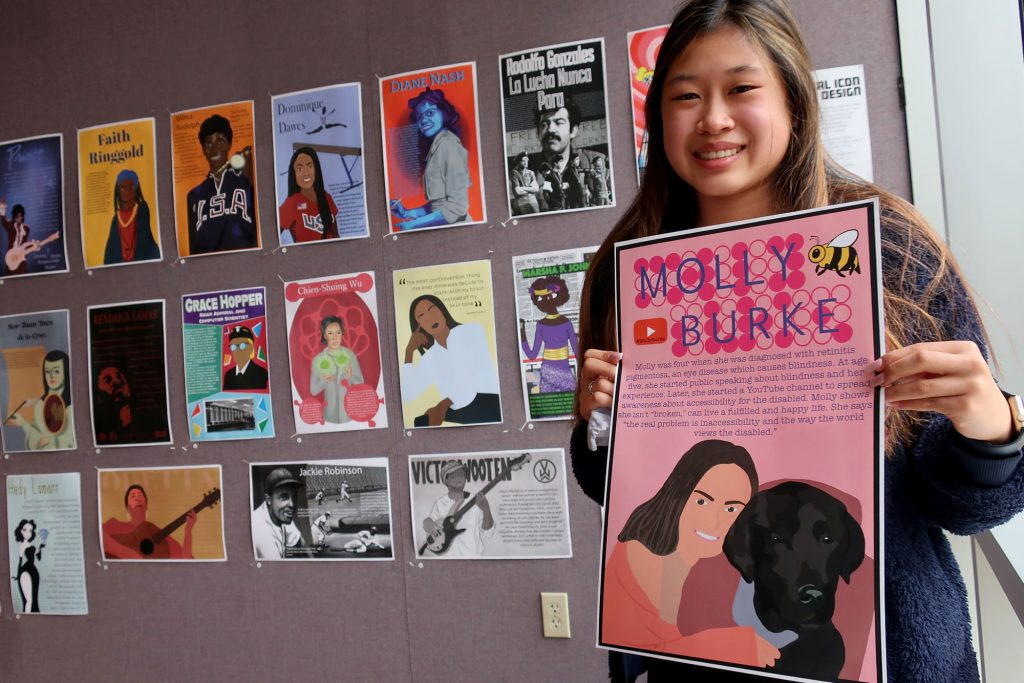
Junior Amy Goldman’s cultural icon poster represented Molly Burke, a Canadian YouTube personality and motivational speaker who has retinitis pigmentosa, a deterioration of the retina that caused her to go blind at 14. On her YouTube channel, she talks about her experiences with blindness, her daily life and offers fashion and make-up advice. She also advocates for disability rights and chronicles her life with her guide dog, Gallup.
“Molly is definitely an inspiration to the world because she shows you can live without sight. When I first saw her on YouTube, I didn’t know she was blind until after she said it. No one’s really different until you know that. There’s a video where she went skydiving, where she didn’t have any fear and she just went for it even though she can’t see. The fact that she’s motivated to do stuff even though she can’t see is really motivating for me. Molly Burke had a lot of challenges with making friends because she can’t really see or do everything that all the other kids can do. An obstacle for me would be like with gymnastics, I have mental blocks so pushing through that like Molly did with making friends or getting through high school as a kid was really motivating.”
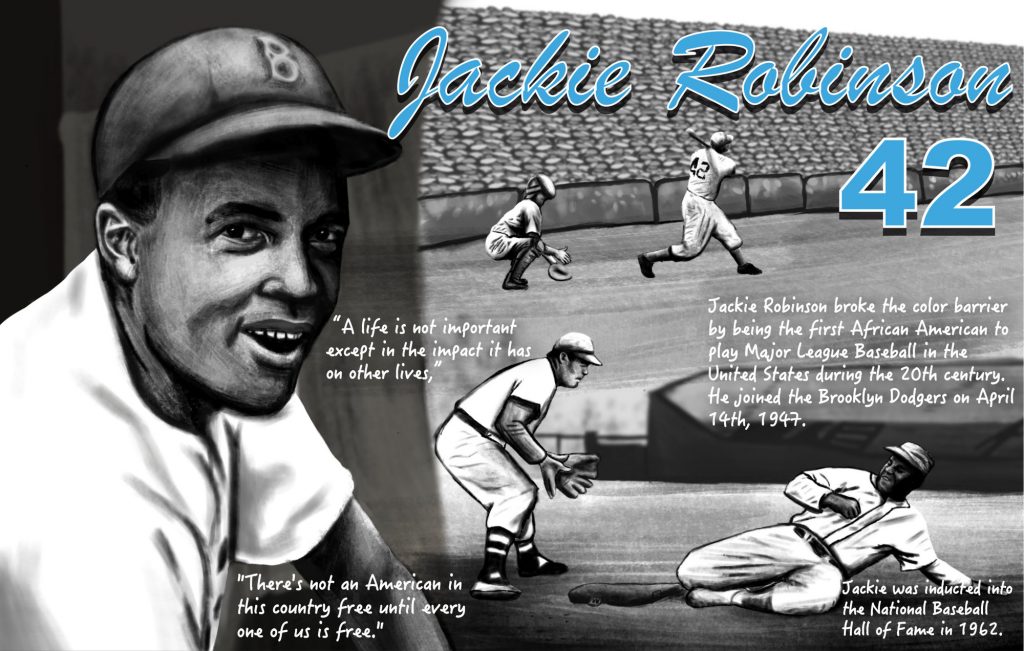
Joe Constransitch, a junior, designed a poster of Jackie Robinson, the professional baseball player who was the first African American to play Major League Baseball in the modern era. Prior to that, Black baseball players had to play in the Negro Leagues. Robinson was inducted into the Baseball Hall of Fame in 1962. He was also a veteran, business man, and civil rights activist who fought against segregation in many aspects of life.
“I loved his story and how he inspires people. He always brings people up. I loved some of his quotes, like this one, ‘There’s not an American in this country free until we’re all free.’ Especially now with what’s going on, it means a lot because it’s important to remember that a lot of people of color are struggling … like with cops. It’s being shined light on, which is good and now we can try and fix it. When I was younger I saw the movie “42” [named after Jackie Robinson’s number.] He had to struggle so hard yet he was one of the best players, and yet they didn’t want to put him in just because of his skin color. Especially as a kid, I didn’t understand that. It showed me the importance of the issue.”









